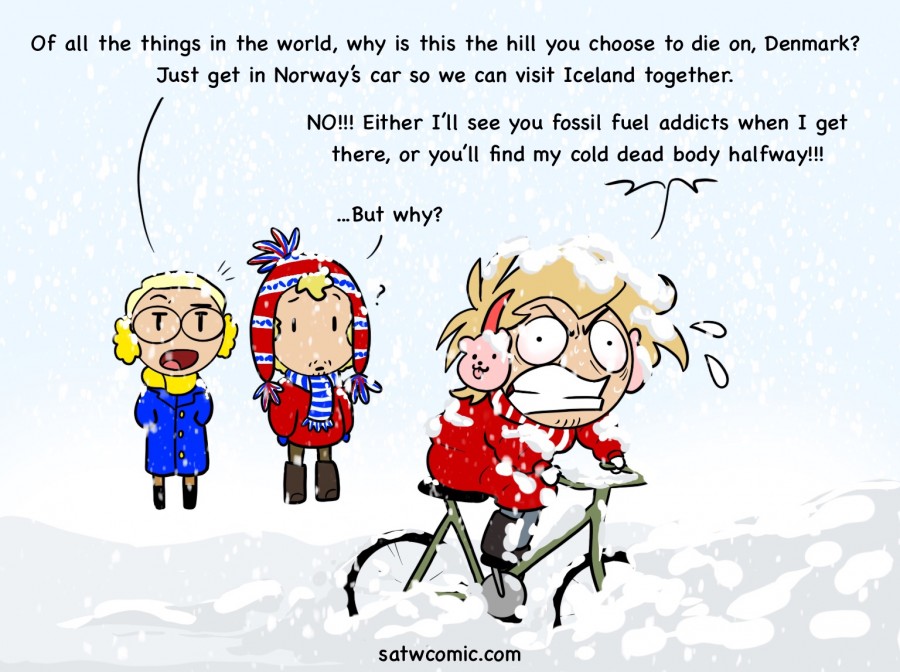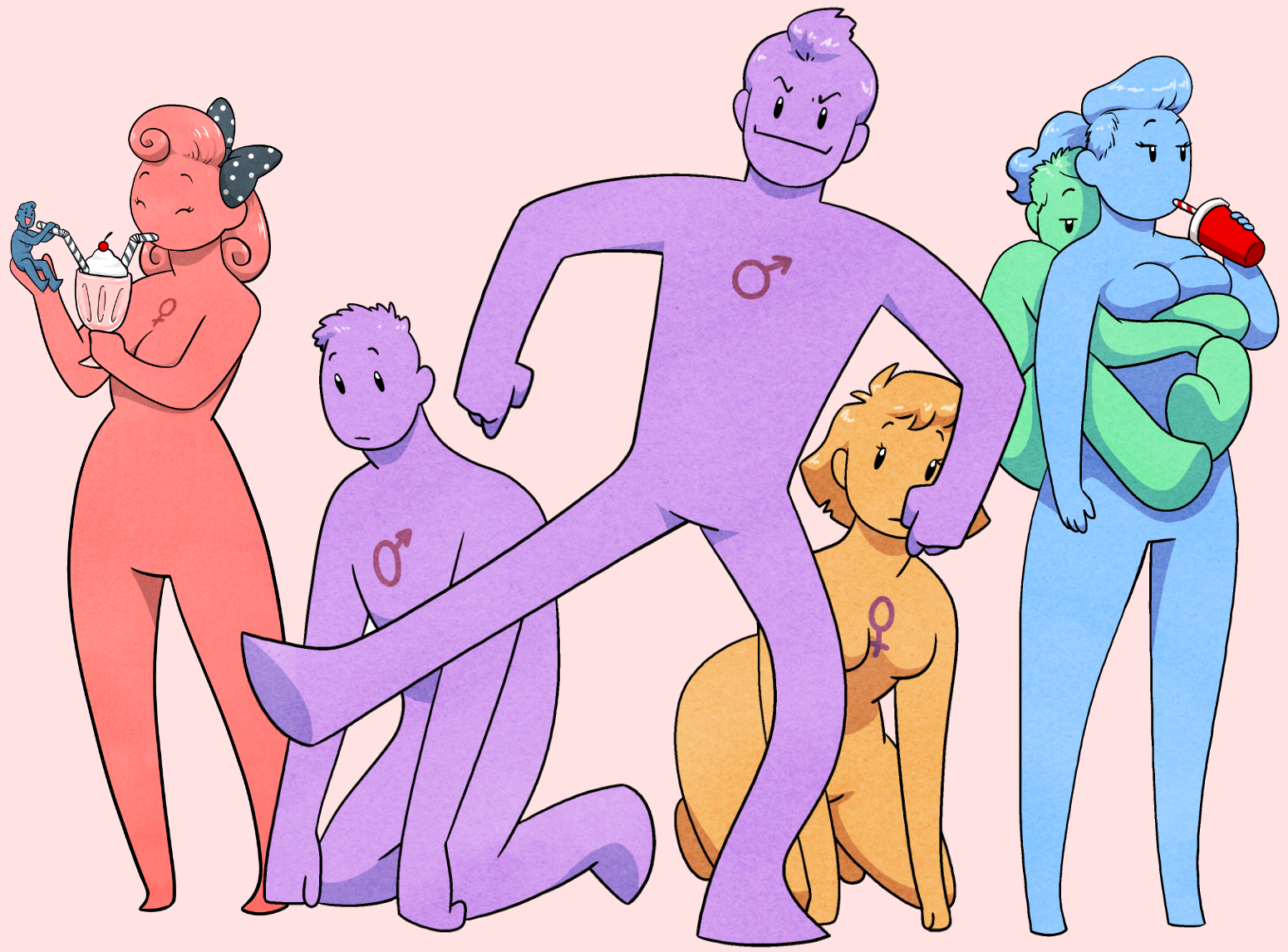
A very snowy hill
We’ve had a fair few snowstorms in Denmark in the past month, especially where I live, and the staggering amount of people who still chose to bike to work is insane.
Bikes are a very standard mode of transportation here, and many only have a bike (me included), instead opting for busses and trains for longer travels (A lot of people who own cars even choose to take the bus to work because it’s cheaper and they don’t have to find a parking spot). BUT taking the bike made no sense in this weather because you had to walk most of the way anyway. I should know because I was one of the fools who stubbornly chose my bike every day despite the fact that it added FIVE HOURS to my travel time compared to if I had just taken the bus. We are all creatures of habit I suppose.
Denmark Sweden Norway Bicycle
18th February 2021
5 years ago #9855202
5
2
Sigh. Look, to the degree that you need to get exercise for your health, doing something productive with it (such as transport) rather than non-productive (such as going to the gym) is a very good thing [but see the caveat at the bottom]. I do reforestation, for example.
But transporting yourself with physical labour *beyond* your minimum exercise needs is *NOT* helping the environment; it's *hurting* it. Exercise burns calories. It's unavoidable; that's what drives your muscles; and no, a reduction in basal metabolism doesn't come close to compensating. Literally, the act of elevated breathing is the act of consuming oxygen and exhausting CO2. Now, if food production and human labour were efficient and clean, that would be one thing. But they're not. They're *terribly* inefficient processes (particularly if there's meat in the diet, but even if it's all plants). Even with the low energy needs to walk or propel a bicycle, there's a massive environmental footprint to walking or biking. Literally half of the planet's arable surface has been converted to food production already - creating massive water shortages and runoff problems in places and eliminating huge amounts of habitat, including driving many species to extinction. A quarter of the planet's greenhouse gas emissions come from food production (https://ourworldindata.org/food-ghg-emissions) - more than mechanized transportation as a whole. Increasing your food consumption is a *terrible* thing to do.
This is not to excuse cars. Rather, it's to encourage people to electrify their transportation, because that has a dramatically lower environmental footprint when combined with clean power. And indeed, bikes can play a part because:
* Electric car: good
* Electric bus: better
* Electric bike: best
The environmental footprint of an E-bike, both in terms of manufacturing and consumption is *tiny* (note: the environmental footprint of using a vehicle is almost always far higher than the footprint of its production). An electric car may get 150Wh/km or more while an E-bike on throttle alone may get 20Wh/km. For a 12km average daily travel distance, that's 240Wh. By contrast, fixed solar panels at 15% average daily capacity factor and 20% efficiency yield 720 watt hours per square meter per day. But to do 12km per day cycling with human power would take about 400 calories. That's nearly a kilogram of CO2 per day on an average diet in *direct* emissions alone - the equivalent of burning 2/5ths of a litre of petrol. If you "eat healthy" - e.g. if you eat lots of vegetables and protein rather than grains, plant-based fats and sugars - your CO2 footprint per calorie is *significantly higher*. In addition, you need an extra 300 square meters (a square 17 meters on each side) of farmland/ranchland to produce those calories - with all of the fertilizer / pesticide / herbicide inputs and runoff that entails. Vs. 1/3rd of a square meter of solar panels on a roof. It's a *dramatic* difference.
So *by all means* get an E-bike and use that pedal assist! But don't burn more calories than you *need to* for your health, unless you hate the planet.
** Caveat: when "doing exercise for your health", also consider adverse health consequences... specifically, injuries. Pedestrians and cyclists are far more likely to be injured per unit distance than car or bus passengers. Indeed, they're so much more likely to be injured per unit distance that even if you removed all passenger vehicles from the roads and had only buses and freight, they'd still be significantly more likely to be injured per unit distance.
** Additional caveat: the same note about the environmental footprint of food applies to anti-packaging-waste drives. BY ALL MEANS, we should cut down on packaging waste, particularly plastics, where we can. But it's critical that at the same we don't encourage a greater degree of food wastage, as most packaging is designed to help the product arrive at its destination in-tact and unspoiled. You shoot yourself in the foot, environmentally, if you significantly increase food waste in order to save a couple grams of plastic.
But transporting yourself with physical labour *beyond* your minimum exercise needs is *NOT* helping the environment; it's *hurting* it. Exercise burns calories. It's unavoidable; that's what drives your muscles; and no, a reduction in basal metabolism doesn't come close to compensating. Literally, the act of elevated breathing is the act of consuming oxygen and exhausting CO2. Now, if food production and human labour were efficient and clean, that would be one thing. But they're not. They're *terribly* inefficient processes (particularly if there's meat in the diet, but even if it's all plants). Even with the low energy needs to walk or propel a bicycle, there's a massive environmental footprint to walking or biking. Literally half of the planet's arable surface has been converted to food production already - creating massive water shortages and runoff problems in places and eliminating huge amounts of habitat, including driving many species to extinction. A quarter of the planet's greenhouse gas emissions come from food production (https://ourworldindata.org/food-ghg-emissions) - more than mechanized transportation as a whole. Increasing your food consumption is a *terrible* thing to do.
This is not to excuse cars. Rather, it's to encourage people to electrify their transportation, because that has a dramatically lower environmental footprint when combined with clean power. And indeed, bikes can play a part because:
* Electric car: good
* Electric bus: better
* Electric bike: best
The environmental footprint of an E-bike, both in terms of manufacturing and consumption is *tiny* (note: the environmental footprint of using a vehicle is almost always far higher than the footprint of its production). An electric car may get 150Wh/km or more while an E-bike on throttle alone may get 20Wh/km. For a 12km average daily travel distance, that's 240Wh. By contrast, fixed solar panels at 15% average daily capacity factor and 20% efficiency yield 720 watt hours per square meter per day. But to do 12km per day cycling with human power would take about 400 calories. That's nearly a kilogram of CO2 per day on an average diet in *direct* emissions alone - the equivalent of burning 2/5ths of a litre of petrol. If you "eat healthy" - e.g. if you eat lots of vegetables and protein rather than grains, plant-based fats and sugars - your CO2 footprint per calorie is *significantly higher*. In addition, you need an extra 300 square meters (a square 17 meters on each side) of farmland/ranchland to produce those calories - with all of the fertilizer / pesticide / herbicide inputs and runoff that entails. Vs. 1/3rd of a square meter of solar panels on a roof. It's a *dramatic* difference.
So *by all means* get an E-bike and use that pedal assist! But don't burn more calories than you *need to* for your health, unless you hate the planet.
** Caveat: when "doing exercise for your health", also consider adverse health consequences... specifically, injuries. Pedestrians and cyclists are far more likely to be injured per unit distance than car or bus passengers. Indeed, they're so much more likely to be injured per unit distance that even if you removed all passenger vehicles from the roads and had only buses and freight, they'd still be significantly more likely to be injured per unit distance.
** Additional caveat: the same note about the environmental footprint of food applies to anti-packaging-waste drives. BY ALL MEANS, we should cut down on packaging waste, particularly plastics, where we can. But it's critical that at the same we don't encourage a greater degree of food wastage, as most packaging is designed to help the product arrive at its destination in-tact and unspoiled. You shoot yourself in the foot, environmentally, if you significantly increase food waste in order to save a couple grams of plastic.
5 years ago #9854991
4
0
*meanwhile in Texas*
Uh... yeah... I'd like potable water please....It's been a week... boiling snow on a woodburning stove sucks...
Uh... yeah... I'd like potable water please....It's been a week... boiling snow on a woodburning stove sucks...
5 years ago #9854857
4
0
Ugh, I hate upright bicycles. The only thing I can ride without pain is a recumbent the upright seating. Problem is those are $3000 bicycles and there's no way in hell I would ever leave it where it is subject to theft or vandalism.
I think bicycle theft belongs in the category of "this is why we can't have nice things".
I think bicycle theft belongs in the category of "this is why we can't have nice things".
5 years ago #9855147
3
0
Meanwhile in America:
School is in another town
Work is in another town
My town is not bike friendly

School is in another town
Work is in another town
My town is not bike friendly
5 years ago #9855106
2
0
When I was a teenager, I was something of a bicycling nut, and I had a good lightweight bike for fun, and a heavier bike with fenders and thicker tires to commute to work in bad weather. And yeah, I'd be doing this all winter (in southern New England), much to the amusement of my co-workers. If the roads were clear enough for cars, they were clear enough for me!  All this changed when I got my own apartment. Now I was living ten miles from work instead of three; I had no place in the building to conveniently store a bike, and nowhere to set up a bike rack for doing maintenance; and last but not least, I bought a car, and subsequently did a lot less bicycling. Although I have to say, my first car, a Ford Escort, was not all that much better in the snow than my bicycle was.
All this changed when I got my own apartment. Now I was living ten miles from work instead of three; I had no place in the building to conveniently store a bike, and nowhere to set up a bike rack for doing maintenance; and last but not least, I bought a car, and subsequently did a lot less bicycling. Although I have to say, my first car, a Ford Escort, was not all that much better in the snow than my bicycle was. 
5 years ago #9854858
2
0
Well, in Northern Norway, many of us (me included) still take the bike in snowstorm 
I have to confess I usually hate myself everytime I do it... ^^"
I have to confess I usually hate myself everytime I do it... ^^"
5 years ago #9854840
2
0
I'm not a fan of driving myself but in America it's almost mandatory to own one since there are moments where it takes 3 hours or more just to get to your job, honestly I wish I could have the luxury of things being close enough to ride a bike or walk and no car needed.
Add comment: Please Sign in or create an accout to comment.



 Support the comic on
Support the comic on 


































"We didn't winterize any of our power plants, all of them including the gas, coal and nuclear plants failed, so it must be the fault of the wind turbines in spite of them making up only 1/4 of the electricity in the state! Also, we refuse to be connected with the rest of the country's power grid, because that'd mean we'd have to *gasp* follow a few rules! More importantly, being connected means being able to buy electricity as well as sell it; we are Texas dangnabbit and we won't ever let anyone sell us energy!"